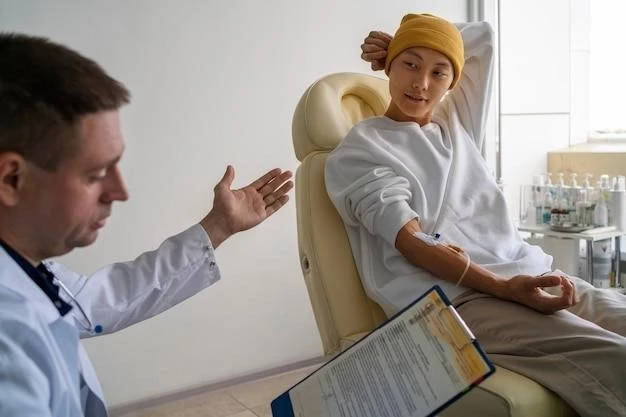Disease ⎼ Grosse Syndrome
Grosse Syndrome, also known as Grosse disease, is a rare genetic disorder affecting multiple body systems. This article provides a comprehensive overview of Grosse Syndrome, including its symptoms, diagnosis, treatment options, and impact on mental health. Stay tuned for valuable insights!
Introduction to Grosse Syndrome
Grosse Syndrome, also referred to as Grosse disease, is a rare and complex genetic disorder that impacts various bodily systems. This illness is characterized by a wide array of symptoms that can affect individuals differently. Understanding the underlying causes of Grosse Syndrome involves exploring genetic mutations that lead to the development of this disorder.
Individuals diagnosed with Grosse Syndrome may experience challenges in their daily lives due to the diverse range of health issues associated with the condition. As a result, managing Grosse Syndrome requires a multidisciplinary approach involving healthcare professionals from various specialties.
Research into Grosse Syndrome is ongoing, aiming to enhance diagnostic techniques, treatment options, and overall quality of life for affected individuals. By shedding light on the complexities of this condition, we can better support those living with Grosse Syndrome and work towards improving outcomes for patients and their families.
Understanding the Basics of Grosse Syndrome
Grosse Syndrome is a rare genetic disorder characterized by abnormalities in various bodily systems, including the musculoskeletal, cardiovascular, and gastrointestinal systems. This syndrome is caused by mutations in specific genes that affect the body’s ability to function normally.
Individuals with Grosse Syndrome may experience a wide range of symptoms, such as skeletal abnormalities, heart defects, and gastrointestinal issues. The severity of these symptoms can vary widely among affected individuals, making the management of Grosse Syndrome complex and challenging.
Understanding the basics of Grosse Syndrome involves recognizing the genetic basis of the disorder and how it manifests in different organs and tissues. By studying the underlying mechanisms of Grosse Syndrome, researchers aim to develop targeted therapies that address the specific needs of individuals with this condition.
As we deepen our understanding of the basics of Grosse Syndrome, we can improve diagnostics, treatment strategies, and support systems for individuals and families affected by this rare disorder. By raising awareness and promoting research, we can make significant strides in enhancing the overall care and outcomes for those living with Grosse Syndrome.
Signs and Symptoms of Grosse Syndrome
Grosse Syndrome presents a wide array of signs and symptoms that can impact multiple body systems. Common manifestations of this disorder include skeletal abnormalities such as enlarged hands and feet, joint stiffness, and curvature of the spine.
Individuals with Grosse Syndrome may also experience cardiovascular issues like heart valve abnormalities, which can affect heart function and lead to complications if not managed appropriately. Gastrointestinal symptoms such as hernias and digestive problems are also prevalent in individuals with this syndrome.
Other signs of Grosse Syndrome may include vision and hearing impairments, respiratory issues, and neurological abnormalities. The range and severity of symptoms can vary among individuals, necessitating personalized treatment plans tailored to address specific manifestations of the disorder.
Recognizing the signs and symptoms of Grosse Syndrome is crucial for early diagnosis and intervention. By understanding the distinct characteristics of this disorder, healthcare providers can offer comprehensive care that addresses the complex needs of patients with Grosse Syndrome, improving their quality of life and overall health outcomes.
Diagnosis and Medical Evaluation
Diagnosing Grosse Syndrome involves a comprehensive medical evaluation that includes a thorough review of the individual’s medical history, assessment of symptoms, physical examination, and various diagnostic tests. Genetic testing plays a crucial role in confirming the presence of genetic mutations associated with Grosse Syndrome.
Medical professionals may utilize imaging studies such as X-rays, CT scans, and MRIs to assess skeletal abnormalities and detect any structural defects in the heart or other organs. Additionally, cardiac evaluations, including echocardiograms, are essential to monitor heart function and identify potential cardiac complications.
Laboratory tests may be conducted to evaluate organ function, assess genetic markers, and rule out other conditions with similar symptoms. A multidisciplinary approach involving geneticists, cardiologists, orthopedic specialists, and other healthcare providers is often necessary to ensure a comprehensive diagnosis and personalized treatment plan for individuals with Grosse Syndrome.
Early and accurate diagnosis of Grosse Syndrome is critical for initiating timely interventions and implementing appropriate management strategies to address the diverse health issues associated with this rare genetic disorder. Through ongoing medical evaluations and monitoring, healthcare teams can optimize care and improve outcomes for individuals living with Grosse Syndrome.
Treatment Options for Grosse Syndrome
Managing Grosse Syndrome involves a multidisciplinary approach aimed at addressing the diverse range of symptoms and complications associated with this genetic disorder. Treatment options for Grosse Syndrome focus on symptom management, supportive care, and addressing specific health issues that may arise.
Orthopedic interventions, such as physical therapy, bracing, or surgery, may be recommended to address skeletal abnormalities and improve mobility and function; Cardiac abnormalities associated with Grosse Syndrome may require close monitoring by cardiologists and potentially surgical interventions to manage heart defects.
Individuals with Grosse Syndrome may benefit from personalized treatment plans that address their unique needs and symptoms. Supportive therapies such as occupational therapy, speech therapy, and nutritional counseling can play a crucial role in enhancing quality of life and overall well-being.
Medical management of Grosse Syndrome may involve the use of medications to alleviate specific symptoms or prevent complications. Regular follow-up appointments with healthcare providers are essential to monitor disease progression, adjust treatment plans as needed, and provide ongoing support to individuals with Grosse Syndrome.
By combining medical interventions, therapeutic approaches, and supportive care strategies, healthcare teams can help individuals with Grosse Syndrome effectively manage their condition, improve functional abilities, and enhance their overall quality of life. Ongoing research and advancements in treatment options continue to offer hope for individuals living with Grosse Syndrome.
Living with Grosse Syndrome
Living with Grosse Syndrome presents unique challenges that can impact daily life and overall well-being. Individuals diagnosed with this rare genetic disorder often require ongoing medical care, specialized interventions, and emotional support to navigate the complexities of the condition.
Adjusting to the physical and emotional aspects of Grosse Syndrome can be a significant journey for both patients and their families. Coping with the limitations imposed by skeletal abnormalities, cardiovascular issues, and other health complications may require resilience, adaptation, and a strong support network.
Despite the challenges posed by Grosse Syndrome, many individuals demonstrate remarkable strength and courage in facing the uncertainties associated with the disorder. Engaging in therapies, connecting with support groups, and accessing resources for individuals with rare diseases can help foster a sense of community and empowerment.
Education and advocacy play vital roles in raising awareness about Grosse Syndrome, promoting access to specialized care, and driving research initiatives to improve treatment options and outcomes for affected individuals. By sharing experiences, insights, and resources, the Grosse Syndrome community can unite in a common goal of enhancing quality of life and advancing knowledge about this complex disorder.
Living with Grosse Syndrome requires a holistic approach that encompasses physical health, emotional well-being, and social support systems. Through resilience, perseverance, and a collaborative healthcare team, individuals with Grosse Syndrome can navigate the challenges of the condition and strive for meaningful and fulfilling lives.
Impact on Mental Health and Well-being
Grosse Syndrome can have a profound impact on the mental health and well-being of individuals living with this rare genetic disorder. Coping with the physical challenges, uncertainties about the future, and potential social limitations associated with Grosse Syndrome can take a toll on one’s emotional state.
Feelings of anxiety, depression, isolation, and frustration are common among individuals with Grosse Syndrome, as they navigate the complexities of managing their health and adjusting to the impacts of the condition on their daily lives. The emotional burden of living with a rare and potentially disabling disorder can be overwhelming at times.
Support from mental health professionals, psychologists, or counselors can be beneficial for individuals with Grosse Syndrome to address their emotional needs, coping strategies, and mental well-being. Open communication with healthcare providers, family members, and peers can also foster a sense of connectedness and understanding.
Promoting self-care practices, engaging in activities that bring joy and fulfillment, and maintaining strong social connections are essential components of supporting mental health in individuals with Grosse Syndrome. Seeking out peer support groups or online communities can provide valuable opportunities for sharing experiences and receiving empathy and encouragement.
By recognizing and addressing the impact of Grosse Syndrome on mental health and well-being, individuals can work towards building resilience, finding effective coping mechanisms, and enhancing their overall quality of life. Integrating mental health support into comprehensive care plans is essential for promoting holistic wellness and supporting the emotional needs of those affected by Grosse Syndrome.
Research and Future Perspectives
Research plays a pivotal role in advancing our understanding of Grosse Syndrome and paving the way for future developments in diagnosis, treatment, and management of this rare genetic disorder. Ongoing studies focus on identifying new genetic markers, unraveling disease mechanisms, and exploring novel therapeutic approaches.
Genetic research aims to elucidate the specific gene mutations responsible for Grosse Syndrome, allowing for earlier and more accurate diagnosis through genetic testing. By pinpointing the root causes of the disorder, researchers can develop targeted therapies that address underlying genetic abnormalities and improve outcomes for individuals with Grosse Syndrome.
Clinical trials and research collaborations are essential for evaluating the effectiveness of potential treatments, investigating disease progression, and identifying biomarkers that can inform personalized care strategies for individuals with Grosse Syndrome. Participating in research studies offers patients the opportunity to contribute to scientific advancements and potentially benefit from cutting-edge therapies.
Future perspectives for Grosse Syndrome include the refinement of diagnostic techniques, the development of precision medicine approaches tailored to individual genetic profiles, and the exploration of gene editing technologies to correct genetic mutations. Collaborative efforts among researchers, healthcare providers, advocacy groups, and affected individuals hold promise for driving innovation and improving outcomes in the field of Grosse Syndrome.
By investing in research, fostering interdisciplinary collaborations, and advocating for rare disease awareness, we can accelerate progress in addressing the complexities of Grosse Syndrome and ultimately provide hope for a brighter future for individuals living with this challenging genetic disorder.

Conclusion
In conclusion, Grosse Syndrome, a rare genetic disorder affecting multiple body systems, poses significant challenges for individuals and healthcare professionals. Understanding the complexities of this condition, from its genetic basis to the diverse range of symptoms and associated health issues, is essential for providing comprehensive care and support.
Diagnosis, treatment, and management of Grosse Syndrome require a multidisciplinary approach that addresses the unique needs of each individual. By integrating medical interventions, supportive therapies, and mental health services, healthcare teams can help individuals with Grosse Syndrome navigate the complexities of their condition and improve their quality of life.
Research advancements and ongoing studies hold promise for enhancing diagnostic techniques, developing targeted therapies, and improving outcomes for individuals living with Grosse Syndrome. Collaboration among researchers, healthcare providers, and advocacy groups is crucial for driving innovation and raising awareness about this rare genetic disorder.
As we strive towards a better understanding of Grosse Syndrome and work towards improving care and support for affected individuals, it is essential to prioritize holistic wellness, promote mental health, and foster a sense of community among those impacted by this challenging condition. By joining forces in research, advocacy, and patient care, we can make meaningful progress in the field of Grosse Syndrome and offer hope for a brighter future.
